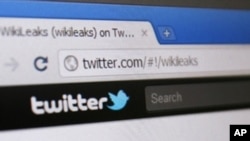An Ethiopian journalist has fled his country and is considering seeking asylum in the west after being named in a leaked U.S. diplomatic cable. The case is believed to be the first in which a mention in a Wikileaks cable has had direct consequences for a journalist.
Argaw Ashine, the Addis Ababa correspondent for Kenya’s Daily Nation newspaper says he fled Ethiopia last week to avoid possible arrest for revealing sensitive information.
Argaw was named in a leaked 2009 US diplomatic cable as the source who tipped off the staff of an anti-government newspaper about a Communications Ministry plan to silence them. Soon after, the paper closed its doors and six of its top journalists went into exile.
In a telephone interview from an undisclosed location, Argaw said he became concerned days after the cable leak when the Communications Ministry called him in and revoked his journalist’s license. But he panicked and fled when he was summoned to federal police headquarters and told to reveal the source of the information.
"I was called to the federal police and the inspector in the office, and they advised me I should disclose my source, which mentioned on the Wikileaks document, otherwise it might not be good for me," said Argaw.
Argaw, an Ethiopian, said he hated to leave his homeland, but is considering whether to seek permanent asylum in another country.
He said his decision to flee was influenced by news that five journalists had been charged in recent days with violating a tough new anti-terrorism law.
"As you know there is an anti-terrorism law and it is not easy for me to stay at home in such conditions because at any time they can take me to the prison or any consequence," he said. "Even the police inspector said I might face any consequences if I failed to disclose my source. And so finally I decided to leave my country."
Ethiopian government spokesman Shimeles Kemal said Thursday he was shocked to learn Argaw had fled, and said he would be welcomed back if he chooses to return. Shimeles denied that the journalist’s accreditation had been revoked, and said a check with police officials produced no evidence that Argaw had been summoned for questioning.
"The law does not entitle any public official to force a journalist to divulge the identity of his sources," said Shimeles. "Journalists have institutional and legal protection from divulging the source of their information."
Shimeles suggested Argaw might be suffering from delusional fear bordering on paranoia, and said there is not a shred of evidence to support the journalist’s charges. He called most of the allegations “absolute lies”.
The press freedom group Committee to Protect Journalists issued a statement noting that Argaw is the first journalist to suffer direct repercussions as the result of a Wikileaks cable. CPJ Executive Director Joel Simon said, “The threat we sought to avert through (editing) of initial Wikileaks cables has now become real.”
He urged greater caution in releasing names in what were meant to be confidential dispatches, saying “a citation in one of these cables can easily provide repressive governments the perfect opportunity to persecute or punish journalists and activists”.
Ethiopian Journalist Named in Wikileaks Cable Flees Country




